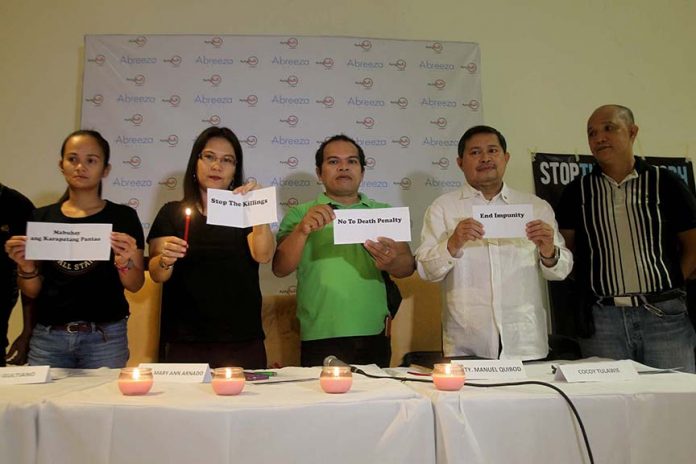
END KILLIOrganized groups in Davao City on Saturday called on the government to pursue its war against illegal drugs and “to stop the killings at the same time.”
Speaking at a briefing on the 68th year commemoration on the Universal Declaration of Human Rights, Attorney Mary Ann Arnado, convenor of the Network against Killings, said stopping drugs and pursuing the killings “is not a sustainable policy for government.”
Network against Killings is a national network of human rights organizations of peace loving Filipinos and peace-loving citizens who have expressed concern about the rise of vigilante killings.
She said killing those people involved in the drug trade is not the sole solution to the war against illegal drugs.
Arnado said the community must come up with measures against the practice of killing the offenders who are described as having resisted authorities.
Atty. Manuel Quibod, Dean of the College of Law at the Ateneo de Davao University, pointed out that human rights must be upheld at all times regardless of the era.
“Regardless of martial law period or who runs the administration of government, human life must be given paramount importance given that there is God who created life,” Quibod said.
Quibod stressed that taking away life as provided by the constitution must be preceded by due process.
“Those who fought for human rights in pursuit of the freedom and valued human life during the martial law years is an assertion of belief that continues until today,” Quibod said.
He added that respect for human rights is universal and that determination of incorrigibility by people involved in the use of illegal narcotics must be addressed and must not be determined in general.
“There must be data that mentions that people into illicit drug use are incorrigible,” Quibod pointed out, asking whether there has been an effort on the part of the country or any agencies to qualify the notion.
He added that both government and the stakeholders must collaborate in the effort of fighting against illegal drugs and must not rely solely on one prescription.
Quibod explained that the Dangerous Drugs Act calls on the offenders to reform, adding that effective enforcement of rules on engagement and addressing the drug menace as a public health issue must be followed in solving the problem of illegal drug use in the country.
He added the government sector must be informed of the alleged involvement of those people in the list of drug offenders in the Philippine National Police (PNP) to qualify the basis and to get away with the belief that it was done out of baseless accusations.
“At the end of the day, someone must take the responsibility,” he stressed.






